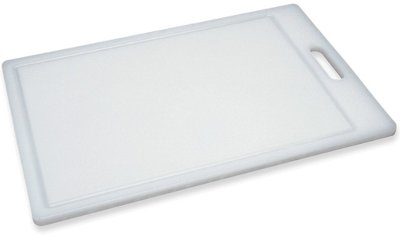
Best cutting board for meat?

After soaking our wood cutting board in bleach water I decided we
needed a second cutting board.
What's the best
cutting board for meat?
We'll drive this one around the block a few times and report back on
how useful the juice groove is and if it makes the cut.
Want more in-depth information? Browse through our books.
Or explore more posts by date or by subject.
About us: Anna Hess and Mark Hamilton spent over a decade living self-sufficiently in the mountains of Virginia before moving north to start over from scratch in the foothills of Ohio. They've experimented with permaculture, no-till gardening, trailersteading, home-based microbusinesses and much more, writing about their adventures in both blogs and books.
Want to be notified when new comments are posted on this page? Click on the RSS button after you add a comment to subscribe to the comment feed, or simply check the box beside "email replies to me" while writing your comment.

Hi Anna and Mark,
You are probably aware that "bacteria" disappear on wood surfaces quickly?
This is NOT true of man-made surfaces (plastic).
I forget where I first read this, but the author commented that most folks would probably continue to use plastic dispite the clear risk.
The implication was that bleach with wood was not needed ???? Maybe?? And that bleach with plastic wasn't very good!
How to measure it and tell for sure?
If you search you will probably know much more than I remember pretty quickly!
warm regards to you both, John
Read about the research at UC Davis.
The conclusions:
From the standpoint of hygiene, a glass cutting board would probably be best. Nothing much grows on glass. But it would play havoc with your knives.
I also have read and heard that wood boards are the best since they are forgiving. A good hardwood board wiped well, or when using it for some meat washing it with soap and water and rinse well, is best. I have never had a problem with getting sick or any of my guests getting sick. As Anna knows. I feed a great many people over the course of a year! For several years now, people are so afraid of "germs" that they want everything sterilized. Many germs are beneficial and help ones immune system. When everything is sterilized, the body's immune system is put off balance.
So clean off the wood cutting board and do not use the plastic one. The wood one is better on your knives as well as your health.
Here is a link to an article I wrote on this topic a few years ago. In this article is a link to an earlier one. The two, taken together, provide a good view of my position on the subject.
http://blog.larryeiss.com/2008/05/19/food-safe-wood/
I am curious to learn why you decided to wash your wooden cutting board with bleach.
The more I learn, the more I think plastic is pretty much always evil. I am working hard to avoid it wherever possible.
The salt solution makes a perfect environment for lactobacillus bacteria. (Same as lacto fermentation of pickles and saurkraut) Lactobacillus likes to eat all that bad stuff that can make us sick.
So... My vote is for a good hardwood cuttingboard.